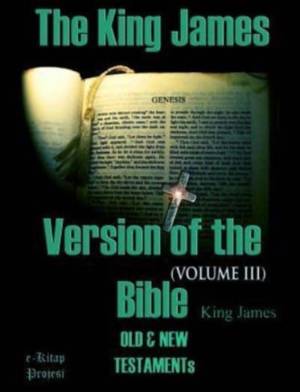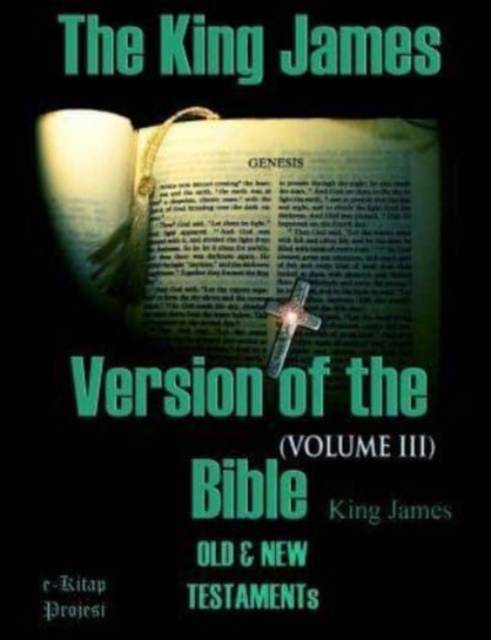
- Retrait gratuit dans votre magasin Club
- 7.000.000 titres dans notre catalogue
- Payer en toute sécurité
- Toujours un magasin près de chez vous
- Retrait gratuit dans votre magasin Club
- 7.000.000 titres dans notre catalogue
- Payer en toute sécurité
- Toujours un magasin près de chez vous
60,95 €
+ 121 points
Format
Description
The King James Version (KJV), commonly known as the Authorized Version (AV) or King James Bible (KJB), is an English translation of the Christian Bible for the Church of England begun in 1604 and completed in 1611. First printed by the King's Printer Robert Barker, this was the third translation into English to be approved by the English Church authorities. The first was the Great Bible commissioned in the reign of King Henry VIII, and the second was the Bishops' Bible of 1568. In January 1604, King James I convened the Hampton Court Conference where a new English version was conceived in response to the perceived problems of the earlier translations as detected by the Puritans, a faction within the Church of England.James gave the translators instructions intended to guarantee that the new version would conform to the ecclesiology and reflect the episcopal structure of the Church of England and its belief in an ordained clergy. The translation was done by 47 scholars, all of whom were members of the Church of England. In common with most other translations of the period, the New Testament was translated from Greek, the Old Testament was translated from Hebrew text, while the Apocrypha were translated from the Greek and Latin. In the Book of Common Prayer (1662), the text of the Authorized Version replaced the text of the Great Bible - for Epistle and Gospel readings - and as such was authorized by Act of Parliament. By the first half of the 18th century, the Authorized Version was effectively unchallenged as the English translation used in Anglican and Protestant churches. Over the course of the 18th century, the Authorized Version supplanted the Latin Vulgate as the standard version of scripture for English speaking scholars. Today, the most used edition of the King James Bible, and often identified as plainly the King James Version, especially in the United States, closely follows the standard text of 1769, edited by Benjamin Blayney at Oxford.Editorial Criticism: F. H. A. Scrivener and D. Norton have both written in detail on editorial variations which have occurred through the history of the publishing of the Authorized Version from 1611 to 1769. In the 19th century, there were effectively three main guardians of the text. Norton identified five variations among the Oxford, Cambridge and London (Eyre and Spottiswoode) texts of 1857, such as the spelling of "farther" or "further" at Matthew 26:29.In the 20th century, variations between the editions was reduced to comparing the Cambridge to the Oxford. Distinctly identified Cambridge readings included "or Sheba" (Josh. 19:2), "sin" (2 Chr. 33:19), "clifts" (Job 30:6), "vapour" (Psalm 148:8), "flieth" (Nah. 3:16), "further" (Matt. 26:39) and a number of other references. In effect the Cambridge was considered the current text in comparison to the Oxford.Cambridge University Press introduced a change at 1 John 5:8 in 1985 reverting its longstanding tradition of having the word "spirit" in lower case to have a capital letter "S". It has also done the same in some of its publications in Acts 11:12 and 11:28. These are instances where both Oxford and Cambridge have now altered away from Blayney's 1769 Edition. The distinctions between the Oxford and Cambridge editions has been a major point in the Bible version debate. Differences among Cambridge editions, in the 21st century, has become a potential theological issue, particularly in regard to the identification of the Pure Cambridge Edition.TranslationThe English terms "rejoice" and "glory" stand for the same word in the Greek original. In Tyndale, Geneva and the Bishops' Bibles, both instances are translated "rejoice". In the Douay-Rheims New Testament, both are translated "glory". Only in the Authorized Version does the translation vary between the two verses.In the Old Testament the translators render the Tetragrammaton YHWH by "the LORD" (in later editions in small capitals as LORD), or "the LORD God"
Spécifications
Parties prenantes
- Auteur(s) :
- Editeur:
Contenu
- Nombre de pages :
- 622
- Langue:
- Anglais
- Collection :
- Tome:
- n° 3
Caractéristiques
- EAN:
- 9781502476838
- Date de parution :
- 23-09-14
- Format:
- Livre broché
- Format numérique:
- Trade paperback (VS)
- Dimensions :
- 189 mm x 246 mm
- Poids :
- 1096 g







